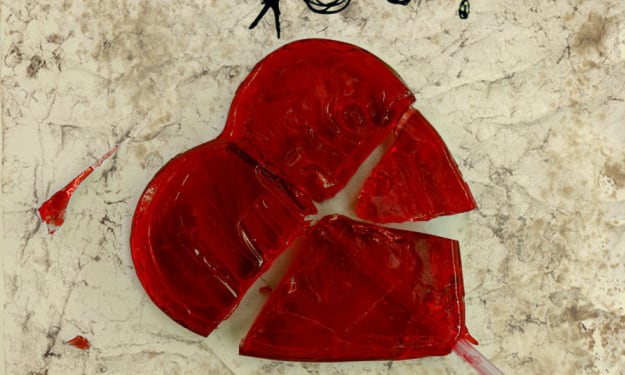Relapse
In an ideal world, once you're out of therapy, you'd be fine to go it alone. But in reality, relapses happen and they can be crushing.

September 2017 seems worlds away now. I was discharged from the mental health services up in Yorkshire and moving my stuff back down South to London. I was in a good place. I'd completed therapy and, armed with my medication, I felt like I could take on anything. I felt like the world was my oyster, and that I could now cope without the help of professionals.
How wrong could I have been? I feel so naive now. I set myself up for a huge fall by thinking so highly, and that was a huge mistake on my part. Enter the beginning of 2018 and I'm now battling those internal demons once more. My self-harm thoughts and suicidal ideations are slowly coming back — and I don't particularly know why. My life is good, great even. I'm doing well at University. I have amazing friends around me. I have the most amazing boyfriend and am officially in my longest and most stable relationship.
But that is the difficult part of mental illness; it often has no explanation. I'm diagnosed with Borderline Personality Disorder and, if I'm being honest, I didn't receive all of the treatment I needed. Despite my desires to be seen quicker by the gender clinic (they won't see me if I'm under the mental health team — mental health comes first), I should have fought to be transferred to my new local mental health team rather than being discharged. I was told I needed DBT (a year-long therapy) and intensive psychotherapy — I didn't get either of those, I didn't even get close to receiving those. There are a lot of past demons that I haven't fought away yet, and I need help to do that.
I'm being referred for yet another assessment of my mental health so that the appropriate therapies can be given to me. My doctor won't change my medication because "the goal is to get you off medication, not keep changing it." And she was right. I shouldn't be changing my medication whenever my mental health rears its ugly head once more, I should be getting the intensive treatments that I need — and if that comes at the price of waiting longer for my medical transition, then I guess that will have to be that, and I'll have to deal with it.
There's somewhat of a stigma attached to relapse. Once you're out of the mental health system, everyone assumes you're fine now. They think you're "normal" again. Our society is yet to fully understand mental health and just how serious it can be. It can live within any of us, and it can come back at any time. As a culture we need to stop stigmatising those of us who suffer mentally. We need to focus on supporting those mentally ill people around us and we need to focus on giving them the treatment they deserve and so desperately need.
Relapse doesn't have to be a dirty word. It should be accepted for what it is, a sad reality of life. Relapses happen at any time. Sometimes people go through therapy and do fine on their cocktail of medications — and sometimes people relapse and need help again. Mental health issues, especially diagnoses like Borderline Personality Disorder, are rarely easily sorted — they're often lifelong illnesses that need serious and very intense treatment. There's no medication that can fix mental health problems in the long term. They can make us happier for a while, but eventually we have to face the reality of how our mind works and we need help to rewire it.
When you experience a relapse you realise just how delicate your mind actually is. The tiniest of things can trigger you to regress into a bad mental state. For me, it was my overthinking, impulsivity and paranoia that triggered things for me. I'm now haunted by my bad thoughts again. I'm haunted by thoughts of my past. I'm haunted by the demons I thought I'd banished for good.
Here's some advice for people experiencing a relapse:
You're not alone. It's normal to relapse and help is out there for you. Don't be afraid to speak to your doctor and ask for additional help and support. Don't be afraid to admit you may need more therapy. Don't be afraid to admit to yourself that you may be on medication for longer than you hoped. Being medicated for your mental health isn't a bad thing, and going through numerous rounds of therapy isn't a bad thing either.
About the Creator
Skylar Rose Pridgeon
I am a 21 year old transgender writer interested in politics, poetry and human relationships/sexuality. I do freelance journalistic work and am a journalism student at UEL.






Comments
There are no comments for this story
Be the first to respond and start the conversation.